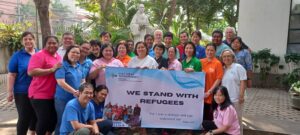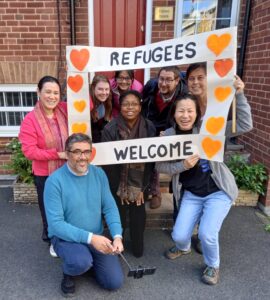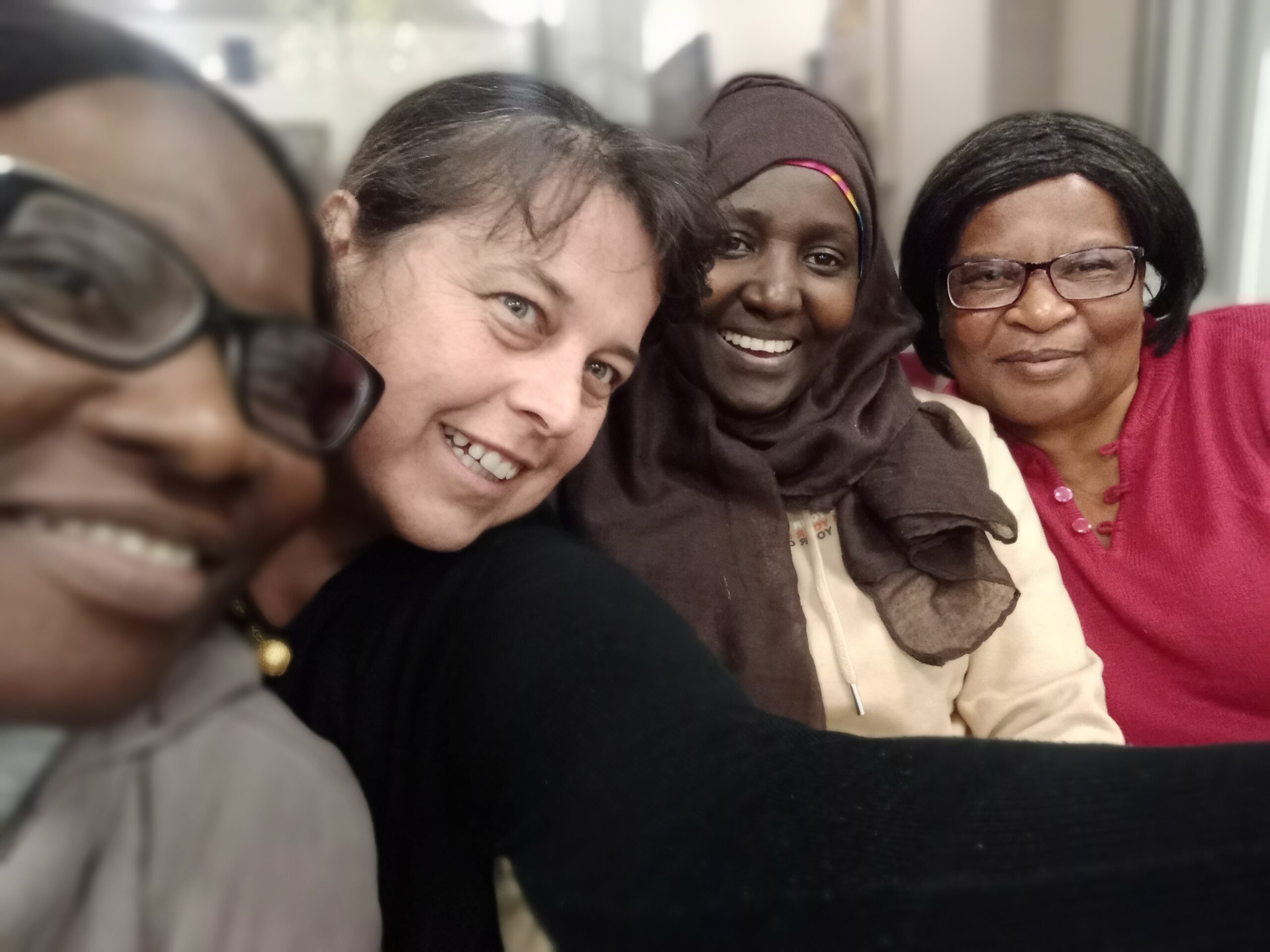World Day of Migrants and Refugees is Sunday 29th September 2024. Nathalie Marytsch has been a Columban Lay Missionary in Birmingham for more than twenty years. The call to mission has seen her accompanying refugees and diverse communities of people newly arrived in the UK. Her encounters serve as a reminder that behind the anti-immigration headlines in mainstream media there are individual lives marked by pain, resilience and a hope for a better future.
Time and again, news reports about migration from around the world reflect anti-immigration narratives. This rhetoric dominates the headlines in many mainstream media outlets and social media platforms.
The arrival of migrants is often portrayed as an invasion and migrants are labelled as job-takers and criminals. Disturbingly, some link the arrival of migrants to the dilution of societal values or racial purity.
It is widely accepted that migration is one of the main crises affecting the world today. According to UN figures, in 2023 more than 110 million people were forcibly displaced.
A third of them are refugees, and three-quarters of that figure are internally displaced people. These are individuals who have no option but to leave home, to cross frontiers for their own safety and for the safety of their loved ones.
Often, when I see on the news that migrants are being negatively portrayed and blamed for already existing problems in society, I feel there is a flaw in that discourse. Frequently, they neglect to explain why people are forced to flee.
For example, in recent years, we have witnessed numerous world conflicts that have forced people to seek protection elsewhere: the Rohingya people in Myanmar, the invasion of Ukraine leading to an exodus of millions, and Venezuelans escaping political conflict, as well as similar situations in South Sudan, Afghanistan, Yemen, and the list goes on.
Through my work as a Columban Lay Missionary, I have had the privilege of journeying alongside refugees and newly arrived communities, sharing at the same table, and learning from ‘brothers and sisters’ of diverse backgrounds and religions. My life has undoubtedly been changed as a result of these encounters and the negatively charged ‘stories’ that I hear do not resonate with my personal experience.
There have been stories that have touched me deeply and have stayed with me, troubling me, and making me feel hopeless and powerless. For example, the stories of two young refugees.
One is a young boy that I met twenty years ago who was aged 16. He had fled war in Bosnia, without a word of English, and had arrived in the UK with his parents and surviving siblings. He had witnessed the massacre of several family members and, as a result, suffered a severe breakdown and needed hospital treatment.

The worldwide community of Columban Lay Missionaries show their support for refugees during a gathering in the Philippines attended by Nathalie Marytsch (far left)..
More recently, I met a young woman from the Middle East who had to endure a forced marriage and abuse. In the end, because of her desire to escape from this humiliating and painful situation, she was rejected by her family and culture, and forced to leave her home and country.
Both stories illustrate the complexities and deep-seated issues that refugees carry with them. The woman’s story sheds light on the intersection of gender-based violence and cultural pressures. Her experience is an example of the additional layers of vulnerability faced by women refugees.
The boy’s story reminds us of the desperate need, faced by so many, to escape conflict and seek protection while processing the trauma of war.
These narratives challenge the often-negative views about refugees and newly arrived communities and underscore the need for empathy, compassion and care in our response to their plight.
This is why Pope Francis has been challenging a prevailing culture of indifference towards refugees and newly arrived communities, most notably in his encyclical ‘Fratelli Tutti: on fraternity and social friendship’. Francis reminds us of God’s abiding love for all and urges us not to turn away from those in great need.
As a person of faith, I feel I cannot be indifferent to the suffering of those around me, whether near or far. Humankind is connected in many ways – through globalisation, the environment and nature, and as children of God. We have to take responsibility for the suffering of others, be it through challenging oppressive structures, through compassionate engagement, or through welcoming the stranger in our midst.
This way, we can begin to address the complex needs of refugees and newly-arrived communities, and contribute to their healing and integration into a new community with hope for a better future.

Columban Faith in Action volunteers with the team at Fatima House in Birmingham, a place of welcome providing shelter and support to destitute women in need of protection in Birmingham.
One way in which Columban Missionaries are responding to Pope Francis’ message is by partnering with the Archdiocese of Birmingham, Father Hudson’s Care and Caritas, to run a shelter for destitute women who are in need of protection.
Fatima House, which opened its doors in 2016, has offered sanctuary to over 50 women, providing support and friendship as well as giving them the strength and courage to continue their journey.
Nathalie Marytsch is a Columban Lay Missionary from Chile who was assigned to Britain in 2001. Since 2013, she has been the coordinator of the British Region’s Invitation to Mission programme providing opportunities for local people to experience cross-cultural mission.
To support the work of Columban Missionaries with refugees, internally displaced people and newly-arrived communities, please donate at: https://columbans.ie/donate/ or send a cheque to: ‘Columban Missionaries’ to the Far East Office, Dalgan Park, Navan, Co Meath C15 AY2Y or Tel: 00353 46 9098275. Thank you!
World Day of Migrants and Refugees is Sunday 29th September 2024.

